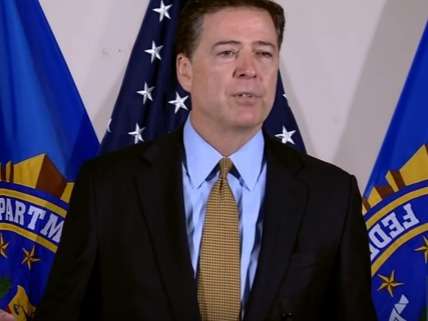Trump Says Comey 'Totally Protected Hillary' but Was Fired for Actions That Hurt Her
The president reverts to his original, highly implausible excuse for dismissing the FBI director.

Donald Trump says his decision to fire FBI Director James Comey is vindicated by the report that Justice Department Inspector General Michael Horowitz released yesterday. "The IG Report is a total disaster for Comey, his minions and sadly, the FBI," the president tweeted this morning. "Comey will now officially go down as the worst leader, by far, in the history of the FBI. I did a great service to the people in firing him."
Since Horowitz's report criticizes Comey, Trump's claim is superficially plausible. But Horowitz's conclusions about the FBI's investigation of Hillary Clinton's email practices as secretary of state are exactly the opposite of Trump's complaints about the investigation. While Horowitz says Comey treated Clinton unfairly, Trump has long argued that Comey let Clinton off easy. Which is it? Anyone who cared about logic or principle would have to choose, but Trump is either oblivious to the contradiction or assumes it will not faze his fans.
This is not the first time the president has asked us to believe he fired Comey because of actions that hurt Clinton, the woman whose imprisonment was a regular theme of Trump's campaign rallies. The initial explanation for Comey's dismissal, laid out in a May 9, 2017, memo by Deputy Attorney General Rod Rosenstein and endorsed by Attorney General Jeff Sessions, focused on the same two incidents that Horowitz found most troubling: Comey's July 5, 2016, press conference, during which he said Clinton should not be prosecuted but criticized her "extremely careless" handling of classified material, and his October 28, 2016, letter informing members of Congress that he had reopened the investigation in light of newly discovered evidence that ultimately added nothing to the case.
Horowitz says Comey's press conference was not only "extraordinary and insubordinate" but violated Justice Department norms aimed at protecting subjects of investigations that do not result in criminal charges. "We concluded that Comey's unilateral announcement was inconsistent with Department policy and violated long-standing Department practice and protocol by, among other things, criticizing Clinton's uncharged conduct," the report says. According to Horowitz, the public reopening of the investigation 11 days before the presidential election was also a glaring departure from department policy and "a serious error of judgment."
Rosenstein said much the same thing in his 2017 memo. Sessions, who had never before criticized Comey for these decisions and had in fact defended both of them, nevertheless concurred with Rosenstein's conclusions. So did Trump, who appended Rosenstein's memo and Sessions letter endorsing it to the letter informing Comey that his services were no longer needed. "I have received the attached letters from the Attorney General and the Deputy Attorney General of the United States recommending your dismissal," Trump wrote. "I have accepted their recommendation."
Trump dropped that pretense two days later. "I was going to fire Comey," Trump told NBC's Lester Holt. "Regardless of [the] recommendation, I was going to fire Comey." He also conceded that the Russia investigation was on his mind at the time, which helped explain his otherwise puzzling statement in the dismissal letter that "I greatly appreciate you informing me, on three separate occasions, that I am not under investigation." According to Trump lawyer Rudy Giuliani, Comey's refusal to say that publicly was one of the main reasons the president fired him.
Now Rosenstein, who helped Trump obscure his motive for firing Comey, is overseeing an obstruction of justice investigation in which that motive looms large, and Trump is once again pretending that he, like Rosenstein and Horowitz, was offended by Comey's shoddy treatment of Clinton. That position seems somewhat at odds with Trump's insistence that Comey should have recommended charges against "Crooked Hillary," who was obviously guilty and got off only because of the FBI's anti-Trump bias. "James Comey lied and leaked and totally protected Hillary Clinton," Trump tweeted last October. "He was the best thing that ever happened to her!"
Horowitz, by contrast, found that the decision not to charge Clinton, who arguably violated a law criminalizing "gross negligence" in the handling of information "relating to the national defense," was "based on the prosecutors' assessment of the facts, the law, and past Department practice." The prosecutors concluded that the offense "likely required a state of mind that was 'so gross as to almost suggest deliberate intention,' criminally reckless, or 'something that falls just short of being willful,' as well as evidence that the individuals who sent emails containing classified information 'knowingly' included or transferred such information onto unclassified systems." While the decision not to bring that charge was controversial, Horowitz says, "we found no evidence that the conclusions by the prosecutors were affected by bias or other improper considerations."
Trump's reaction to Horowitz's report suggests that he thinks Comey was terribly unfair to Clinton, departing from Justice Department policy in ways that hurt her election prospects. Yet Trump also thinks Comey "totally protected Hillary," who belonged in prison rather than the White House. Can those positions be reconciled? Trump does not care, and neither do his supporters.
